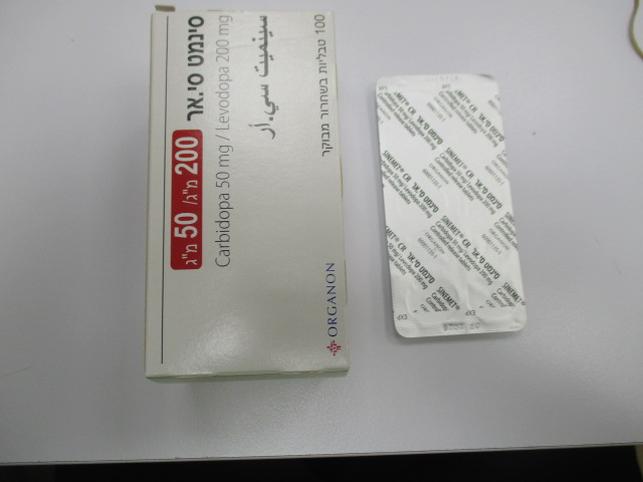Quest for the right Drug

סינמט סי.אר SINEMET CR (CARBIDOPA AS MONOHYDRATE, LEVODOPA)
תרופה במרשם
תרופה בסל
נרקוטיקה
ציטוטוקסיקה
צורת מתן:
פומי : PER OS
צורת מינון:
טבליות בשחרור מבוקר : TABLETS CONTROLLED RELEASE
עלון לרופא
מינוניםPosology התוויות
Indications תופעות לוואי
Adverse reactions התוויות נגד
Contraindications אינטראקציות
Interactions מינון יתר
Overdose הריון/הנקה
Pregnancy & Lactation אוכלוסיות מיוחדות
Special populations תכונות פרמקולוגיות
Pharmacological properties מידע רוקחי
Pharmaceutical particulars אזהרת שימוש
Special Warning עלון לרופא
Physicians Leaflet
Special Warning : אזהרת שימוש
4.4 Special warnings and precautions for use When patients are receiving levodopa monotherapy, levodopa must be discontinued at least eight hours before therapy with 'Sinemet CR' is started (at least 12 hours if slow-release levodopa has been administered). Dyskinesias may occur in patients previously treated with levodopa alone because carbidopa permits more levodopa to reach the brain and, thus, more dopamine to be formed. The occurrence of dyskinesias may require dosage reduction. 'Sinemet CR' is not recommended for the treatment of drug-induced extrapyramidal reactions or for the treatment of Huntingdon’s chorea. Based on the pharmacokinetic profile of 'Sinemet CR' the onset of effect in patients with early morning dyskinesias may be slower than with conventional 'Sinemet'. The incidence of dyskinesias is slightly higher during treatment with 'Sinemet CR' than with conventional 'Sinemet' (16.5% vs 12.2%) in advanced patients with motor fluctuations. 'Sinemet CR' should be administered cautiously to patients with severe cardiovascular or pulmonary disease, bronchial asthma, renal, hepatic or endocrine disease, or with a history of peptic ulcer disease or of convulsions. Care should be exercised in administering 'Sinemet CR' to patients with a history of recent myocardial infarction who have residual atrial, nodal, or ventricular arrhythmia. In such patients, cardiac function should be monitored with particular care during the period of initial dosage administration and titration. Levodopa has been associated with somnolence and episodes of sudden sleep onset. Sudden onset of sleep during daily activities, in some cases without awareness or warning signs, has been reported very rarely. Patients must be informed of this and advised to exercise caution while driving or operating machines during treatment with levodopa. Patients who have experienced somnolence and/or an episode of sudden sleep onset must refrain from driving or operating machines. Furthermore a reduction of dosage or termination of therapy may be considered. As with levodopa, 'Sinemet CR' may cause involuntary movements and mental disturbances. Patients with a history of severe involuntary movements or psychotic episodes when treated with levodopa alone or levodopa/decarboxylase inhibitor combination should be observed carefully when 'Sinemet CR' is substituted. These reactions are thought to be due to increased brain dopamine following administration of levodopa and use of 'Sinemet CR' may cause recurrence. Dosage reduction may be required. All patients should be observed carefully for the development of depression with concomitant suicidal tendencies. Patients with past or current psychoses should be treated with caution. A symptom complex resembling the neuroleptic malignant syndrome including muscular rigidity, elevated body temperature, mental changes, and increased serum creatine phosphokinase has been reported when antiparkinsonian agents were withdrawn abruptly. Therefore, patients should be observed carefully when the dosage of carbidopa-levodopa combinations is reduced abruptly or discontinued, especially if the patient is receiving antipsychotics. Patients with chronic wide-angle glaucoma may be treated cautiously with 'Sinemet CR', provided the intraocular pressure is well controlled and the patient monitored carefully for changes in intraocular pressure during therapy. Periodic evaluations of hepatic, haematopoietic, cardiovascular and renal function are recommended during extended therapy. If general anaesthesia is required, 'Sinemet CR' may be continued as long as the patient is permitted to take oral medication. If therapy is interrupted temporarily, the usual dosage should be administered as soon as the patient is able to take oral medicine. Epidemiological studies have shown that patients with Parkinson's disease have a higher risk of developing melanoma than the general population (approximately 2-6 fold higher). It is unclear whether the increased risk observed was due to Parkinson's disease, or other factors such as drugs used to treat Parkinson's disease. Therefore patients and providers are advised to monitor for melanomas on a regular basis when using 'Sinemet CR' for any indication. Ideally, periodic skin examinations should be performed by appropriately qualified individuals (e.g., dermatologists). Laboratory Tests Abnormalities in various laboratory tests have occurred with carbidopa-levodopa preparations and may occur with 'Sinemet CR'. These include elevations of liver function tests such as alkaline phosphatase, SGOT (AST), SGPT (ALT), LDH, bilirubin, blood urea nitrogen, creatinine, uric acid and positive Coombs’ test. Carbidopa-levodopa preparations may cause a false-positive reaction for urinary ketone bodies when a test tape is used for determination of ketonuria. This reaction will not be altered by boiling the urine specimen. False-negative tests may result with the use of glucose-oxidase methods of testing for glycosuria. Decreased haemoglobin and haematocrit, elevated serum glucose and white blood cells, bacteria and blood in the urine have been reported with standard 'Sinemet'. Dopamine Dysregulation Syndrome (DDS) is an addictive disorder resulting in excessive use of the product seen in some patients treated with carbidopa/ levodopa. Before initiation of treatment, patients and caregivers should be warned of the potential risk of developing DDS (see also section 4.8). Impulse control disorders Patients should be regularly monitored for the development of impulse control disorders. Patients and carers should be made aware that behavioural symptoms of impulse control disorders including pathological gambling, increased libido, hypersexuality, compulsive spending or buying, binge eating and compulsive eating can occur in patients treated with dopamine agonists and/or other dopaminergic treatments containing levodopa including Sinemet CR. Review of treatment is recommended if such symptoms develop.
Effects on Driving
4.7 Effects on ability to drive and use machines Individual responses to medication may vary. Certain side effects that have been reported with 'Sinemet CR' may affect some patients’ ability to drive or operate machinery. Patients treated with levodopa and presenting with somnolence and/or sudden sleep episodes must be informed to refrain from driving or engaging in activities where impaired alertness may put themselves or other at risk of serious injury or death (e.g. operating machines) until such recurrent episodes and somnolence have resolved (see also section 4.4 ‘Special warnings and precautions for use’).

שימוש לפי פנקס קופ''ח כללית 1994
Parkinsonism (idiopathic & postencephalitic), symptomatic parkinsonism caused by carbon monoxide intoxication & cerebral arteriosclerosis in the elderly. יירשם ע"י רופא עצבים ורופא פסיכיאטר
תאריך הכללה מקורי בסל
01/01/1995
הגבלות
תרופה מוגבלת לרישום ע'י רופא מומחה או הגבלה אחרת
מידע נוסף
עלון מידע לצרכן
11.05.20 - עלון לצרכן אנגלית 11.05.20 - עלון לצרכן עברית 11.05.20 - עלון לצרכן ערבית 08.11.22 - עלון לצרכן אנגלית 08.11.22 - עלון לצרכן עברית 08.11.22 - עלון לצרכן ערבית 12.06.23 - עלון לצרכן אנגלית 12.06.23 - עלון לצרכן עברית 12.06.23 - עלון לצרכן ערבית 06.11.23 - עלון לצרכן עברית 07.12.23 - עלון לצרכן אנגלית 07.12.23 - עלון לצרכן ערבית 11.05.20 - החמרה לעלון 08.11.22 - החמרה לעלון 29.03.24 - החמרה לעלוןלתרופה במאגר משרד הבריאות
סינמט סי.אר